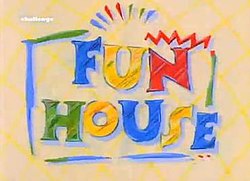Fun House (UK game show)
| Fun House | |
|---|---|

Opening title
|
|
| Genre | Game show |
| Created by | Bob Synes |
| Presented by | |
| Voices of | Gary King |
| Country of origin | United Kingdom |
| No. of series | 11 |
| No. of episodes | 146 |
| Production | |
| Executive producer(s) |
|
| Producer(s) |
|
| Running time | 56.87 minutes |
| Production company(s) |
STV Productions (Scottish Television) |
| Release | |
| Original network | ITV Network (CITV) |
| Picture format | PAL(576i) |
| Audio format | Monaural |
| Original release | 24 February 1989 – 29 December 1999 |
| Chronology | |
| Related shows | Fun House (US version) |
Fun House was a British children's game show produced by Scottish Television and based on the American show, that aired on CITV from 24 February 1989 to 29 December 1999. It usually aired on Fridays (with the exception of Series 4, which aired on Wednesdays and Series 5 & 6, which aired on Thursdays). It was hosted by Pat Sharp, who was also aided by twin cheerleaders, Melanie Grant supporting the red team and Martina Grant supporting the yellow team. The announcer was Gary King. The theme tune was composed by David Pringle and Bob Heatlie.
Each episode featured 2 teams each consisting of a boy and girl representing schools from around the UK. There were 3 rounds in each episode.
The opening games were referred to as messy games and typically used gunge as opposed to food. One game would be for the two boys, another game for the two girls and a third game for all four players, though the order would vary from episode to episode. In later series occasionally all games would be for all four players. From Series 1 to 2 the contestants were usually barefoot when playing some of the messy games, this was discontinued from Series 8 until the show's end. One of the three games would be a "key game", in which the losing team would get the same points as their score in that game.
As in the original American version, a question would follow each game, to the value of 25 points if answered correctly.
The Grand Prix was run in red and yellow coloured go-karts and lasted for two (later three) laps. Teams race round the track picking up tokens to add to their score, alternating drivers with each lap. The first lap was for "10" tokens for 10 points, the second for "25" tokens for 25 points, plus 25 points for winning the race. Tokens that ended up on the floor were null and void.
The tokens were later dropped into appropriately coloured boxes and added to the team's current score.
By 1995, the Grand Prix was extended to three laps and the numbered tokens were replaced with generic silver tokens with a blue stripe, and they were all worth 25 points. The winning team received 50 points and there was no driver changeover after the second lap.
The original format was revived in late 1995, but kept the third lap (which became a speed lap for 25 points, not 50) and the higher value tokens were collected first.
...
Wikipedia
